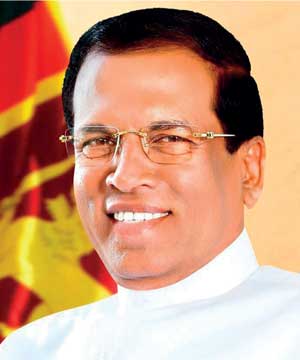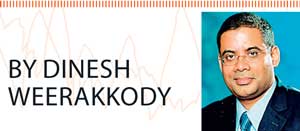12 Aug 2016 - {{hitsCtrl.values.hits}}
 President Sirisena, who has a good understanding of what is happening on a daily basis in rural Sri Lanka – where majority of our people resides – has asked for greater support for small and medium enterprises (SMEs) as their development would directly improves the livelihoods of lower-middle class Sri Lankans and wants his government to actively create avenues to support private sector investment including providing tax concessions
President Sirisena, who has a good understanding of what is happening on a daily basis in rural Sri Lanka – where majority of our people resides – has asked for greater support for small and medium enterprises (SMEs) as their development would directly improves the livelihoods of lower-middle class Sri Lankans and wants his government to actively create avenues to support private sector investment including providing tax concessions
where possible.
Credit for SMEs from banks has been in short supply, where loans and other long-term funds have generally been hard to come by for many reasons. Therefore, support for SME agriculture, healthcare and education has to be bumped up if the government is looking to promote sustainable development and reconciliation.
Education is another key sector that needs new investments. Technological innovation in the educational sector will produce ‘bots’ or robots that can teach and answer questions in real time, as automated student advisors; this will take place within the next 10 years. The country is not geared to support such innovations. Therefore, the specific sustainable development goals to be adopted must be made clear.
Sustainable development requires sound economic governance and a focused domestic policy  framework to facilitate inclusive growth and there by advance the economic, environmental and social welfare of all our people and also the planet we live in. The benefits of economic growth have to be more widely distributed because inclusive growth is the cornerstone of sustainable development. Mainstreaming sustainability considerations in policymaking will, in turn,
framework to facilitate inclusive growth and there by advance the economic, environmental and social welfare of all our people and also the planet we live in. The benefits of economic growth have to be more widely distributed because inclusive growth is the cornerstone of sustainable development. Mainstreaming sustainability considerations in policymaking will, in turn,
support inclusiveness.
Strong growth performance in the last 10 years has reduced extreme poverty in many of our regions, along with broader development. But much work remains to be done because better growth is contingent on strong and sustained domestic reforms. Structural weaknesses, such as poor infrastructure, low investment in education, low productivity and huge social deficits unless addressed, would prevent us from realizing our full
growth potential.
Important lesson
The important lesson of recent decades is that, although economic growth is vital and necessary, it is not enough to create shared and sustainable prosperity. That requires shifting the focus of development policies to address not only ‘inequalities of income’ but also ‘inequalities of opportunity’. This distinction is important because different kinds of deprivation reinforce each other.
Lack of access to adequate healthcare, basic nutrition, clean drinking water, better sanitation and quality education, for example, can harm people’s employment prospects, widening the gap even further between the haves and have-nots and creating a vicious spiral of inequality.
For sustainable development to succeed, growth must be made more inclusive, by addressing social and environmental deficits. It is essential for the government to launch integrated and well-designed packages of inclusive policies to boost opportunities for productive employment and job security, equitable access to finance and to provide adequate access to basic services, such as education, healthcare, energy and water. Addressing the shortcomings of inclusive growth, together with prudent and consistent management of risk to growth, has to be a key part of our country’s transformation for the real sustainable future the
people want.
Way forward
From now on, the package of reforms needs to be very clear. There should be no room for playing with tax payers’ money. Wasteful and unproductive public expenditure has to be curtailed; public institutions have to be more efficient and demand-driven; public enterprises have to be on equal-footing with private enterprises and our debt burden has to be reduced and be manageable. Tax collection has to be fair and efficient. Then for years we have lived on a fragile exchange rate. Weak external finances clearly show the vulnerability of our exchange rate. In the current account of our balance of payments (BOP), it should be the export potential that reflects the country’s productive strength. But, our net exports, showed a US $ 6+billion deficit in 2014, which is covered by over US $ 6.5 billion worker remittance.
In the financial account of our BOP, foreign direct investment is less than US $ 1 billion, but net debt liabilities are over US $ 1.8 billion, this is our debt either directly or indirectly. These are surely not signs of economic and social prosperity, but sheer incompetence and mismanagement. All this needs to change to achieve any form of sustainable development and for us to cross the US $ 100 billion gross domestic product (GDP) target before 2020.
(Dinesh Weerakkody is a senior company director)
10 Jan 2025 1 hours ago
10 Jan 2025 1 hours ago
10 Jan 2025 3 hours ago
10 Jan 2025 3 hours ago
10 Jan 2025 3 hours ago